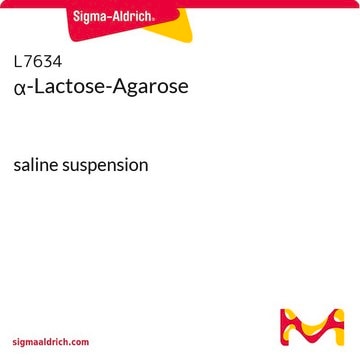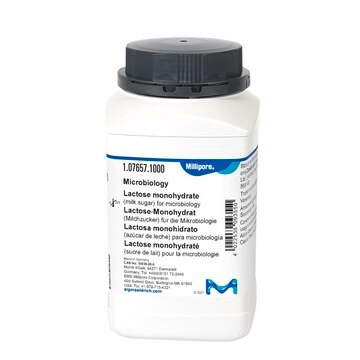L2643
α-Lactose monohydrate
suitable for cell culture, BioReagent
Synonym(s):
β-D-Gal-(1→4)-α-D-Glc, 4-O-β-D-Galactopyranosyl-α-D-glucose, Milk sugar
About This Item
Recommended Products
biological source
bovine milk
product line
BioReagent
Assay
≥99% total lactose basis (GC)
form
powder
technique(s)
cell culture | mammalian: suitable
impurities
≤0.05% Glucose
≤4% β-lactose
solubility
water: 100 mg/mL, clear, colorless
SMILES string
[H]O[H].OC[C@H]1O[C@@H](O[C@H]2[C@H](O)[C@@H](O)[C@@H](O)O[C@@H]2CO)[C@H](O)[C@@H](O)[C@H]1O
InChI
1S/C12H22O11.H2O/c13-1-3-5(15)6(16)9(19)12(22-3)23-10-4(2-14)21-11(20)8(18)7(10)17;/h3-20H,1-2H2;1H2/t3-,4-,5+,6+,7-,8-,9-,10-,11+,12+;/m1./s1
InChI key
WSVLPVUVIUVCRA-KPKNDVKVSA-N
Looking for similar products? Visit Product Comparison Guide
Application
- as a component of fraction B of diluent M1 for dilution of ram semen
- as a component of Platz diluent variant (PDV) for dilution of bottlenose dolphin semen
- in the preparation of HyQ PF-Chinese hamster ovary (CHO) disaccharide media for the adaptation of CHO cell lines
- for the preparation of protein-free chemically defined cell culture medium (PFCDM) for the adaptation of human embryonic kidney 293 (HEK293) cells
Storage Class Code
11 - Combustible Solids
WGK
WGK 3
Flash Point(F)
Not applicable
Flash Point(C)
Not applicable
Personal Protective Equipment
Certificates of Analysis (COA)
Search for Certificates of Analysis (COA) by entering the products Lot/Batch Number. Lot and Batch Numbers can be found on a product’s label following the words ‘Lot’ or ‘Batch’.
Already Own This Product?
Find documentation for the products that you have recently purchased in the Document Library.
Customers Also Viewed
Our team of scientists has experience in all areas of research including Life Science, Material Science, Chemical Synthesis, Chromatography, Analytical and many others.
Contact Technical Service







